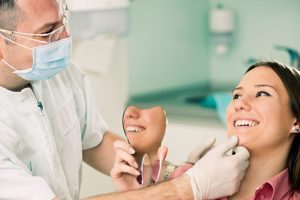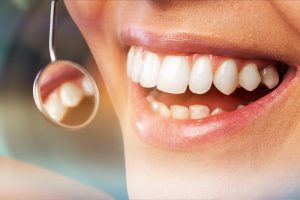April is Oral Cancer Awareness Month
Did you know that April is Oral Cancer Awareness Month? Oral cancer can occur in any part of your mouth, including the tongue, throat, roof of the mouth, gums, and even the lips.

Early detection is the most crucial part of combating this disease. Oral cancer is more common than you might think, but the good news is that it is often curable when discovered and treated during the beginning stages.
What are oral cancer warning signs that I need to be aware of?
- Pain in one or both of your ears that doesn’t impact your hearing.
- Mouth ulcers, sores such as a white lump or red patches that don’t heal.
- Numbness or pain in your mouth or on your tongue.
- Enlarged throat lymph nodes and continuous sore throat, constant feeling of a lump in your throat.
- Difficulty chewing, swallowing or speaking
How does someone get oral cancer?
Oral cancer occurs when the healthy cells in your mouth mutate and change into abnormal cells that can start to form tumors.
Like any cancer, the prognosis for most oral cancers is good with early detection. However, when the mouth cancer goes undetected for an extended period, it can metastasize, spreading to other parts of the body, and become more dangerous.
Certain risk factors increase the chance of getting oral cancer. The biggest risk factors are using tobacco in any form, alcohol abuse, increased sun exposure without proper protection, and Human Papillomavirus (HPV).
HPV is a sexually transmitted virus that usually occurs in genital areas but can also be contracted to areas of the mouth and throat. Some instances of oropharyngeal HPV can lead to oral cancer.
Other factors that can increase the chance of getting oral cancer are a poor diet that is low on fruits and vegetables, chronic mouth irritation, and genetic conditions such as Franconia anemia, which results in decreased production of blood cells.
Why is oral cancer so dangerous?
Oral cancer is a serious condition, but it doesn’t have to be fatal. When diagnosed and treated early, the chances of survival are high. It can be treated through surgery, radiation, and chemotherapy. A medical professional can discuss with you the best course of treatment.
It is dangerous to ignore any of the symptoms mentioned above without discussing it with your dentist. Furthermore, oral cancer is difficult for a patient to detect, especially if they are not experiencing any symptoms. Whereas dentists are trained at identifying the warning signs and can interpret what they mean.
How can seeing a dentist help?
By going to the dentist every 6 months, you give a trained professionals the opportunity to check your mouth for ulcers or sores.
Regular trips to your dentist are not only instrumental in the detection of oral cancer but are also helpful in its prevention. A small spot in your mouth or under the tongue may go unnoticed, especially if you aren’t experiencing any symptoms, but Dr. Imm will specifically check for anything unusual during his screening for oral cancer as a part of your regular dental exam.
Good oral health and hygiene can go a long way toward starving off harmful bacteria that can lead to other complications and illnesses. For example, frequent gum abscess, swelling, and bone loss can be an indication of diabetes. If a patient has never been tested, they will never know that they have it. But a dentist can tell a lot about your overall health, simply by looking at the inside of your mouth.
What can I do to reduce my chances of getting oral cancer?
Keep away from cigarettes, cigars, and e-cigarettes and stop using tobacco products altogether. Tobacco exposes your mouth to dangerous chemicals called carcinogens that increase the risk of developing cancer.
If you drink alcohol, limit your consumption to one or two glasses per day. One glass is equal to 12 ounces of beer, 5 ounces of wine, 1.5 ounces of distilled spirits.
Prolonged exposure to the sun leaves your lips vulnerable to the risk of oral cancer.
When applying sunscreen, people tend to forget to include their lips and face. It is important when spending time in the sun to protect your lips by wearing a hat that provides shade to your face and using sunscreen and lip balm with UV protection of at least SPF 15.
How can I make sure I am doing everything to keep my teeth and gums healthy?
Brush your teeth twice a day with fluoride toothpaste, floss and use mouthwash daily, and see a dentist regularly.
Practicing good oral hygiene not only maintains a clean and fresh mouth, but it can also assist with the prevention of illnesses including periodontitis, or gum disease, diabetes, heart disease, and oral cancer.
The skilled professionals at 5Points Advanced Dentistry are trained to recognize the early signs of oral cancer. If you believe you, or someone you know, is experiencing any symptoms, don’t delay. Call and make an appointment today. 5Points Advanced Dentistry is located in Upper Arlington, Ohio right outside of Columbus.

